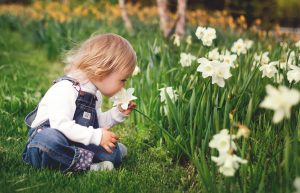Discovering Your Sensory Lexiconary
Friday 30th August 2019
Share this entry:
Guest Blog by Joanna Grace, Founder of The Sensory Projects, Sensory Engagement & Inclusion Specialist, Trainer, Author & TEDx speaker
Did you know you have more than five sensory systems? You probably did.
How many do you think there are? Seven, Nine, Eleven?
We actually have thirty three sets of neurons that control our sensory systems so arguably thirty three senses! I tend to limit my work to seven or eight, occasionally nine on the Develop Your Sensory Lexiconary courses. It is really interesting when you are supporting people who are developing their sensory capacities to have an understanding of what that sensory curriculum looks like.
Perhaps, if you have been working with young children for a while you are noticing that today’s children enter your settings with very different skillsets from the children you met even just five or ten years ago. They might be little whizzes with your phone but much less confident at the messy play activities you provide. If you work with older children, or even adults, you may support people who have sensory differences.
In an age when we are all more aware of the impact the sensory world has on those around us understanding the lineage of each of our sensory systems can help us to better support people who process sensory information differently.
Many conditions effect sensory processing, it is not simply impairments to particular sensory systems that alter people’s experience of the world, people with neurodivergent conditions often experience sensory processing difficulties as a part of their condition, indeed you can have sensory processing disorder as a standalone condition.
People with generative conditions such as Retts or Dementia will experience difficulties with their sensory processing as the different sensory systems erode at different rates. Mental health effects our sensory capabilities, for example people who are depressed experience an impairment to their sense of smell which often in turn impacts their eating habits.
If you support someone who experiences sensory differences it is worth exploring the development of the sensory systems to enable you to better understand their responses. For example if they go into a state of panic when they hear a particular noise, it is no use you telling them that the noise isn’t that loud; that’s not going to get you anywhere.
We are each the authority on our own sensory world, if you see something with your eyes it is real to you, even if I tell you it is not there or it is not scary. Our sensory experiences are our primary form of knowledge, they trump all else. Understanding someone’s sensory differences will equip you to better engage, support and if necessary reassure them. Exploring the impact of the senses on behaviour can give you new ways to communicate with and support someone who is experiencing a crisis that was triggered by sensory difficulties.
If you are wondering where to start why not try some simple sensory games, just pop to http://www.thesensoryprojects.co.uk/guides. All the games you will find there are free to download and based on early sensory development – have fun!
Why attend Childcare Expo?
Join over 2,500 like-minded individuals from the early years sector who are dedicated to improving both practice and their childcare settings.
Attend educational seminars to credit your CPD
Meet the experts to have your questions answered
Receive fantastic onsite offers and discounts
Experience expert-led informative hands-on workshops
Network with peers and industry players
Pick up hundreds of new product ideas and services
And most of all, enjoy a great day out with your colleagues





